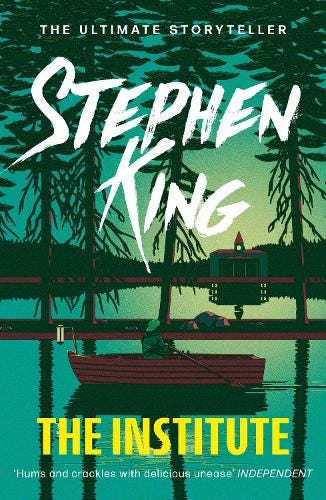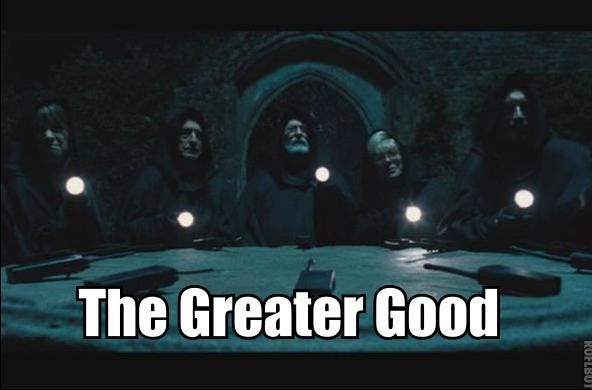Fresh yet familiar
What I learnt from Blur and Stephen King about staying relevant and getting the right balance between trying something new and staying in your lane.
For the past ten years or so, I've been in a race with Stephen King. I'm trying to read his books faster than King writes them. I was a teenage Stephen King fan, staying up late and scaring myself witless with The Shining and The Stand. Then university happened, and I read more "proper" books - which didn't include Big Steve. But like many other things I thought I'd outgrown, I got back into Stephen King in a big way. Inspired by a now-defunct Guardian series, I've been reading King's novels and short story collections chronologically. I'm slowly catching him up - I'm at 2019 King now, having just stayed up late (making myself teary rather than scared) devouring The Institute.
I find myself looking forward to a trip into King's world - like sticking on an album by a favourite band or slipping into a well-worn pair of jeans. Other books take time to get into, particularly if you're unfamiliar with the writer's style. With Stephen King, I'm always straight in. But even with all that King experience, I was surprised by just how much I enjoyed The Institute. Even before having an early-rising toddler, it's been a long time since I've stayed up late devouring a book.
I'm still determining why The Institute struck such a chord (in fact I'm writing this piece to find out). Perhaps it's because it's in the vein of one of my favourite Kings, The Stand - with multiple narrative strands and a classic set-piece finale. Perhaps it's because much of the book centres on the experiences of the children in The Institute; since becoming a dad, I've found childhood-centred narratives even more affecting. It's probably a combination of those two, plus the fact that the novel feels so relevant to our current era. Of course, being Stephen King, it includes a whole bunch of supernatural elements, namely telekinesis, precognition, and, most notably, telepathy. But it's still a highly believable story. I won't do spoilers, but it's believable particularly in its depiction of decisions made by those in power to serve a dogmatic greater good. It is also believable how humans can become desensitised over time to the plight of others. And particularly believable in how belief in that dogmatic cause can trump some of our basic humanity. Everything in service of “the greater good”.
King wrote The Institute while President Trump dominated the US political and media landscape. There are a few specific references to Trump in the novel. Still, the more explicit link is between his administration's border controls and their dehumanising effect on families trapped and often separated at America's borders. But the themes of the book ring even truer to our current era when viewed through a pandemic lens. Especially when recalling discussions around "herd immunity" in the UK, outright denial in parts of America, and how our initial horror over daily death rates gradually and inevitably transformed into numbness, even as case numbers and deaths spiralled. Particularly in the UK and the US, we coveted normality as our Governments prioritised their economies (and their power) - wilfully blind to the painful human side effects on show.
You only need to look at Stephen King's tweets to see that he is highly plugged into the current news trends, and you can feel that influence in his works. Yes, he has a formula, and I'm sure that if you're not one of King's "constant readers" like me, his writing slips across the thin line between "formula" and "formulaic". But I love the blend of "classic King" with the sense of what's happening in the modern world. It's one reason King avoids the plight of many artists with extensive careers - slipping into self-parody. In one of the chapters of The Beatles anthology series, Paul McCartney talks about part of the enduring appeal of The Beatles being that they rarely repeated themselves and slipped into essentially lousy cover versions of their own songs. You might argue the toss over something like "One After 909", but The Beatles set the initial bar for a musical career of experimentation and reinvention. A bar that artists like David Bowie, Radiohead and Beyonce (to name a few of my favourites) have continued to lift.
There are loads of bands I love with long, prolific careers. There are only a few of them where I regularly listen to albums from across their careers. I'll generally give a new Decemberists, Pearl Jam, or Smashing Pumpkins release a whirl. But they rarely strike a chord. Too often, they feel formulaic or like they’re chasing former glories - a far cry from The Institute’s blend of "classic King" and something new, something a bit different. Too often, it's too much of a self-parody, to quote Paul McCartney again. Self-parody is even more likely if the PR promoting the album mentions the dreaded phrase "return to form" or "reminds us of the classic album [x]". Having written a few of those releases in my time, I know all too well that's code for "this is the band writing by numbers because they've got to deliver an album to make some money".
That means it's a genuinely pleasant surprise when a band you love puts out a record that you listen to repeatedly - as I've been doing with Blur's "The Ballad of Darren" and particularly the lead single "The Narcissist". It's a record that's touched a chord with me - it's wistful and reflective, the sound of a bunch of middle-aged men comfortable with where they are in life. It's the sound of a band slipping back into those comfy jeans, but comfy jeans that suit the men they are now. Not their Parklife jeans or Song 2 jeans. New, but also familiar - that hard-to-master blend captured perfectly.
Blur, of course, have an advantage over other artists, being the polar opposite of the prolific Stephen King. There was an eight-year fallow period preceding this record - stepping off the release treadmill and working on other projects has a positive effect on bringing a fresh perspective to the day job.
And it's an approach we can apply to our own day jobs in comms and marketing. It's all too easy to get stuck in a creative rut, particularly when you're on the same account for multiple planning cycles, working with the same people or stuck in the same sector. You stick to what's worked, like a band or an author on a production treadmill. You find it difficult to get out of those familiar mental pathways. You keep ending up with the same answer every time. There's plenty to learn from artists like Blur and Stephen King when breaking these patterns and habits. I've picked out three ways.
Firstly, start with what's happening. Not just the latest trending topics but also the more significant, tectonic shifts. The meta-trends. Campaigns rooted in the current cultural milieu are much more likely to resonate with audiences - especially if you want earned media coverage. A recent example: shoplifting is a massive problem facing all retailers (even in my relatively sleepy home town of Farnham); Waitrose plans to offer police free coffee to deter thieves. Or this from Germany, a specific tattoo that helps drive the opt-in rate for organ donation. So many briefs and campaigns are product or brand-first. Flip it for freshness.
Second, don't try to reinvent the wheel completely. Richard Reed once wrote about brand communications: "It's about simplification, and then it's about exaggeration. That's what great brands do. You boil it down to a few simple, single words that represent what it is you stand for. And then you use all the tools to dramatise and exaggerate". Stick to your core narrative and position, but look for new and different ways to dramatise and exaggerate. Work with a different kind of influencer. Try out a new platform. Experiment with out-there media partnerships. Many clients feel nervous about gaming campaigns - it can all feel a bit "hope you enjoy our new direction!". KFC utilised Street Fighter 6's sandbox for creating playable characters to make a Street Fighter version of Colonel Sanders. Gaming done with much less risk. Or keep it super simple and do a collab with Palace.
And finally, keeping your audiences along with you for the journey is paramount. Stephen King is crystal clear about who he writes for and continually references the "constant reader" who's been with him on his journey. My wife shared an Instagram post from Blur's recent Radio 2 gig - a sea of bald spots watching raptly. Blur aren't doing it for the kids - they know who's most likely to listen to them these days, and it feels like a record made for them (and by them, I mean me). Brands and businesses that have a strong understanding of where their audiences are at, the challenges they're facing and the issues on their mind are those that can stay top of mind. Like the tourist board who knew Brits travel for dentistry.
Keeping your thinking fresh and your ideas vibrant is one of the biggest challenges we face in agency land, but we shouldn't despair if sometimes we default back to the tried and tested. Sometimes, it works (Country House was pure self-parody), and sometimes it doesn't. Even Stephen King has his duds (I skipped over The Tommyknockers and Dreamcatcher with zero regrets). Recognising you need to stay fresh is the first step - getting out, taking a look at the world, and staying in tune with the trends; they're all vital in ensuring your work and thinking are in tune with the now. And if Stephen King can do it at age 75 and after nearly 50 years of publishing novels, you'll be fine.






